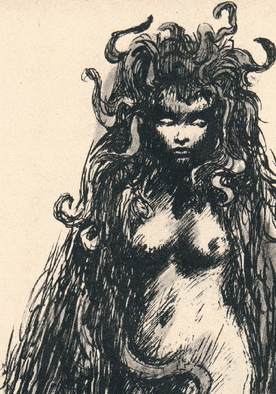Criticism and Contributions of C. L. Moore
Click here for my analysis of Moore's short story "Fruit of Knowledge."
On Moore's Success:
"I sat in the audience at a World Science Ficiton Convention Banquet, listening to Forrest J. Ackerman announce a special award that was about to be presented to a writer. As is customary, Ackerman was saving the name of the recipient for the climax. But he menionted a story called 'Shambleau' and never got to finish his speech. As one, the 2,000 people in the audience came instantly to their feet in unanimous tribute---clapping, shouting and craning to see a gracious and lovely lady blushingly accept the applause.  Many in the audience had never read the story. But everyone knew about it. And everyone knew that Catherine Moore was one of the finest writers of all time in the field of science fiction."
Many in the audience had never read the story. But everyone knew about it. And everyone knew that Catherine Moore was one of the finest writers of all time in the field of science fiction."
---Lester Del Rey, The Best of C. L. Moore (1975)
On "Shambleau" and its Effects:
"Like Sylvia Plath's 'Lady Lazarus, Shambleau could proclaim 'Out of the ash/ I rise with my red hair/ And I eat men like air.'"
---Susan Grubar, C. L. Moore and the Conventions of Women's Science Fiction (1980)
"The Shambleau's glint of amusement at the thought of her transgressive language hints at a more explosive sort of mirth, the sort that Helene Cixous called the laugh of the Medusa. The Medusa is, like the Shambleau, a representation of female autonomy. 'Despite men's fears,' says Cixous, 'she's not deadly. She's beautiful and she's laughing.'"
---Brian Attenby, Decoding Gender in Science Fiction (2002)
"It is probably impossible to explain to modern readers how great an impact that first C. L. Moore story had. Science fiction has learned a great deal from her many examples. But if you could go back to the old science-fiction magazines of the time you might begin to understand. The influences of that story were and are tremendous.
Here, for the first time in the field, we find mood, feeling and color. Here is an alien who is truly alien--far different from the crude monsters and slightly-altered humans found in other stories. here are rounding and well-developed characters. Northwest Smith, for instance, is neither a good guy nor a bad guy--he may be slightly larger than life, but he displays all aspects of humanity. In 'Shambleau,' we also experience as never before both the horror at what we may find in space and the romance of space itself. And--certainly for the first time that I can remember in the field--this story presents the sexual drive of humanity in some of its complexity."
---Lester Del Rey, The Best of C. L. Moore (1975)
On Moore in Feminist SF:
"It is significant that the few women who did venture into the new genre [science fiction], like Moore, often used names that were sexually ambiguous (Leigh Brackett or U. K. Le Guin, for example), or adopted male pseudonyms (the most famous of which is probably James Tiptree Jr, who kept her identity as a female author a secret for many years). Such evasions a deceptions stemming from a fear of male acceptance at either the editorial or the marketing stages in a book's publication also indicate, consciously or not, female authors' own ambivalence about their peculiar position as female authors of sicence fiction. While women such as Moore were pioneers, daring to colonise a traditionally male artistic space, their literature often betrays an  unsettling uncertainty about what exactly their role in this genre is to be--an insecurity which tends to be particularly noticeable in such author's treatment of their female characters, which often dramatises their own doubts and fears."
unsettling uncertainty about what exactly their role in this genre is to be--an insecurity which tends to be particularly noticeable in such author's treatment of their female characters, which often dramatises their own doubts and fears."
---Sarah Gamble, Where No Man Has Gone Before: Women and Science Fiction (1991)
"Is it the masculine register C. L. Moore reading the pulps, or is it the emerging voice of Catherine Lucille Moore?"
---Brian Attenby, Decoding Gender in Science Fiction (2002)
"Written out of her strong identification with the outsider, born of Lilith's alienation, C. L. Moore's stories shed much badly needed light on the history of women's contributions to women's SF...[T]hey remind us that there were successful and pioneering female practitioners of the genre..."
---Susan Gubar, C. L. Moore and the Conventions of Women's Science Fiction (1980)